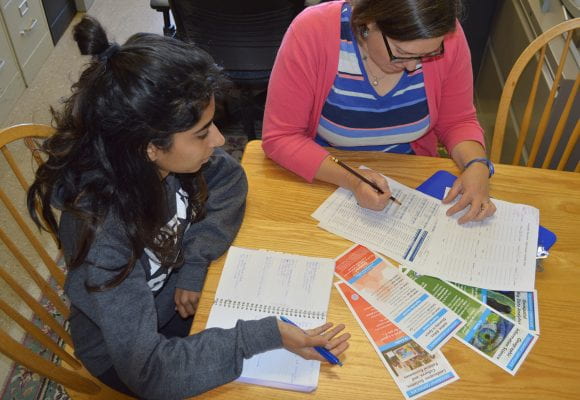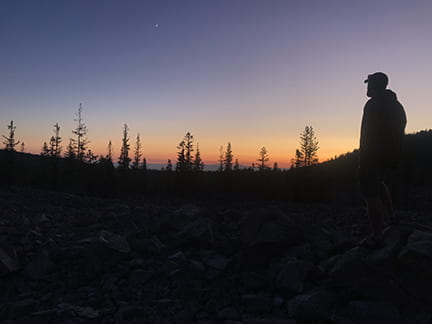IMAGE OF THE WEEK
Adviser Jodi Vender helps undergraduate student Harman Singh plan which courses to take to fulfill the requirements for a certificate in geography. Image: Penn State.
GOOD NEWS
Jamie Peeler was awarded a Graduate Research Innovation Award from the Joint Fire Science Program for her dissertation research in Wyoming.
The EMS Graduate Student Poster Competition and Recognition will take place on Wednesday, October 23. Emily Domanico, Ruchi Patel, and Jaiyan Zhao have been selected to represent our department in the poster competition.
Justine Blanford has a position paper accepted to the Spatial Data Science Symposium: Setting the Spatial Data Science Agenda, December 9–11, 2019
MGIS Student Brandon Green has had a paper “Estimating populations in refugee camps: a toolkit using remotely sensed data” accepted by Digital Government: Disaster Information, Technology, and Resilience Track.
Mikael Hiestand and Andrew Carleton have had a paper, “Growing Season Synoptic and Phenological Controls on Heat Fluxes over Forest and Cropland Sites in the Midwest U.S. Corn Belt,” accepted by the Journal of Applied Meteorology and Climatology.
COFFEE HOUR
Coffee Hour with Laura Leites
Adaptation to climate in forest tree species and implications under a changing climate
More than a century of field studies has demonstrated that forest tree species with large geographic ranges are commonly composed of populations genetically adapted to the climate they inhabit. These populations occupy only a segment of the species climatic range, but their existence allows the species to accommodate the large spatial climate variability within their vast geographic ranges. Adaptation to climate is primarily achieved by synchronizing the trees’ annual growth cycle with the frost-free period of the inhabited climate in order to avoid unfavorable conditions through dormancy. As climate warms, genotypes and climate will be misaligned with important consequences for the growth and survival of forest tree species. However, there are opportunities for management to aid in maintaining well-adapted and productive forests. In this talk I’ll synthesize our knowledge of adaptation to climate in forest tree species, discuss implications under a warming climate, and review management practices aimed at re-aligning genotypes and climate.
- Friday, October 4, 2019
- Refreshments are offered in 319 Walker Building at 3:30 p.m.
- Lecture begins in 112 Walker Building at 4:00 p.m.
- Coffee Hour to Go on Zoom
For more information about Coffee Hour and to view previously recorded Coffee Hour talks visit https://www.geog.psu.edu/calendar/coffee-hour-lecture-series
NEWS
JOB POSTING
Assistant Professor of Health Geography
The Department of Geography at The Pennsylvania State University in State College, Pennsylvania invites applications for a tenure-track Assistant Professor faculty position in Health Geography with a focus on Substance Use and Misuse. Preference will be given to candidates with a research focus in the United States and who utilize quantitative and spatial techniques to address subjects including but not limited to social determinants, population patterns, and health care delivery pertaining to substance use and misuse.
JOB POSTING
Faculty Positions in Understanding Land-Water Systems using Data Analytics
The College of Earth and Mineral Sciences through the Earth and Environmental Systems Institute (EESI) at The Pennsylvania State University, University Park, PA, seeks to hire tenure-line faculty at the assistant or associate rank who study Earth and environmental sciences using new data-driven tools and methods. Candidates for the rank of associate professor typically will have several years of research experience and already hold tenure at another institution and/or qualify for immediate tenure at Penn State.
Geography certificates offer customized degrees for undergraduates
Penn State students who want to customize their bachelor’s degree in geography, add a specific topic in geography to their major, or enhance their career as a non-degree student can now complete undergraduate certificates in geography.
“Certificates are credentials that recognize mastery of a specific area in the discipline,” said Jodi Vender, undergraduate adviser in the Department of Geography. “Ours are 12 credits — fewer credits than a minor — so they fit more easily into a degree program. They can be used as milestones for accomplishment in a specific domain or can stand alone.”
Model helps choose wind farm locations, predicts output
The wind is always blowing somewhere, but deciding where to locate a wind farm is a bit more complicated than holding up a wet finger. Now a team of Penn State researchers have a model that can locate the best place for the wind farm and even help with 24-hour predictions of energy output.

 Pictured at the Lion Shrine, left to right, the new geography faculty members: Luke Trusel, Trevor Birkenholtz, Emily Rosenman, Helen Greatrex, Manzhu Yu, and Panagiotis Giannakis. See news story below; full profiles of all six are forthcoming in the printed Geograph annual newsletter.
Pictured at the Lion Shrine, left to right, the new geography faculty members: Luke Trusel, Trevor Birkenholtz, Emily Rosenman, Helen Greatrex, Manzhu Yu, and Panagiotis Giannakis. See news story below; full profiles of all six are forthcoming in the printed Geograph annual newsletter.

